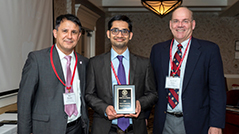At the close of each academic year, the Cornell Materials Science and Engineering department (MSE) hosts an awards dinner, inviting a broad spectrum of its students who are actively involved in materials research – including undergraduate, M.Eng, M.S., and Ph.D. candidates – to present summaries of their research to visiting industry representatives. Their research posters are judged by a team of Cornell MSE faculty and select industry professionals. Mukund Ayalasomayajula, a Master of Engineering student who served as an on-site graduate research assistant for the AREA Consortium was judged to receive the Master of Engineering Project Innovation Award. His thesis project, executed in the Universal Instruments Advanced Process Laboratory, was described in his poster entitled: Processing of Flexible Electronics using Asymmetric Heating. Under the mentorship of AREA staff researcher Peter McClure, Mukund devised methods to create flipchip solder connections to various flexible substrate materials that are incapable of tolerating conventional flipchip soldering without thermal damage. Viable manufacturing methods for low cost, low temperature polymer materials such as polyethylene terephthalate (PET) and thermoplastic polyurethane (TPU) are critical for enabling the rapidly growing flexible hybrid electronics market. This APL manufacturing research was done in collaboration with NextFlex, one of the federally funded National Network of Manufacturing Institutes tasked with promoting innovation for domestic manufacturing. Key to the project success was the ability to define and accurately produce solder reflow profiles under controlled thermal gradients provided by the Fineplacer Pico bonder which had earlier been contributed to the lab by APL industrial partner Finetech.
Archive
- September 2024
- August 2024
- June 2024
- April 2024
- November 2023
- October 2023
- September 2023
- April 2023
- January 2023
- October 2022
- September 2022
- August 2022
- July 2022
- May 2022
- April 2022
- January 2022
- December 2021
- October 2021
- June 2021
- December 2020
- November 2020
- August 2020
- July 2020
- June 2020
- May 2020
- April 2020
- March 2020
- February 2020
- January 2020
- December 2019
- November 2019
- October 2019
- September 2019
- August 2019
- June 2019
- May 2019
- April 2019
- March 2019
- February 2019
- January 2019
- December 2018
- November 2018
- September 2018
- August 2018
- May 2018
- April 2018
- March 2018
- February 2018
- December 2017
- November 2017
- October 2017
- September 2017
- August 2017
- July 2017
- May 2017
- March 2017
- February 2017
- January 2017
- December 2016
- November 2016
- October 2016
- September 2016
- August 2016
- April 2016
- March 2016
- February 2016
- January 2016
- December 2015
- November 2015
- October 2015
- September 2015
- August 2015
- July 2015
- June 2015
- May 2015
- April 2015
- March 2015
- February 2015
- January 2015
- December 2014
- November 2014
- October 2014
- September 2014
- August 2014
- July 2014
- June 2014
- May 2014
- April 2014
- March 2014
- January 2014
- December 2013
- November 2013
- October 2013
- August 2013
- July 2013
- June 2013
- May 2013
- April 2013
- March 2013
- February 2013
- January 2013

